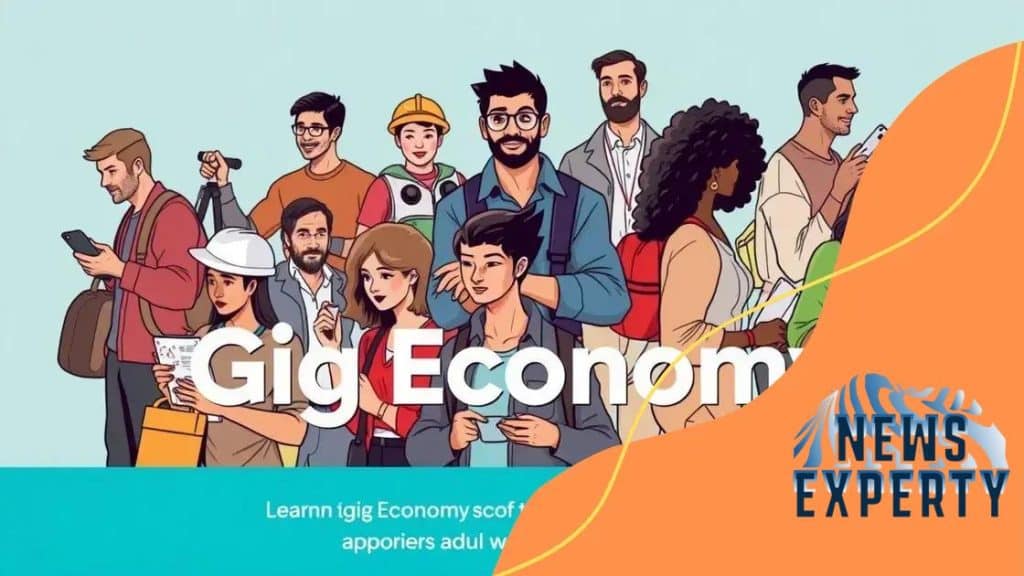How federal health benefits are expanding to gig economy workers

Anúncios
Federal health benefits are expanding to gig economy workers, providing access to programs like Medicaid and the Affordable Care Act, but navigating eligibility and documentation can be challenging.
How federal health benefits are expanding to gig economy workers is a topic that’s becoming increasingly relevant as more people jump into freelance jobs. Have you wondered how these benefits might affect your work life?
Anúncios
The rise of gig economy and its impact on healthcare
The rise of the gig economy has transformed many aspects of work and lifestyle. As more individuals choose flexible jobs, understanding its impact on healthcare becomes essential.
Changing Work Dynamics
Gig work offers many benefits but comes with challenges. Workers can set their own hours, yet they often lack access to traditional employer-sponsored health benefits. This shift means that many are exploring new options.
- Freelancers often juggle multiple clients.
- Health insurance is no longer a standard part of their work.
- Many gig workers struggle to find affordable healthcare solutions.
These factors create a complex situation. Many individuals now seek federal health benefits that may have been previously overlooked. This situation calls for greater awareness and the need for gig workers to advocate for their health.
Anúncios
Gig Workers and Healthcare Access
Access to healthcare has changed dramatically due to the gig economy. Many platforms offer resources, but they may not cover all necessary health needs. Workers must navigate these pathways.
In some cases, short-term insurance plans can fill gaps, but they usually come with limitations. Moreover, many gig workers may feel overwhelmed by the complexities of choosing the right plans. It’s crucial to stay informed and seek the best options for individual circumstances.
Understanding available resources might involve researching local options that cater specifically to gig workers. The availability of community programs can be beneficial, offering alternative pathways to healthcare accessibility.
Understanding federal health benefits available
Understanding federal health benefits is essential for gig economy workers. Many may not realize the options available to them. This knowledge can directly impact their health and well-being.
Types of Federal Health Benefits
Federal health benefits include programs designed to offer coverage to various groups, particularly those under unique work arrangements. One key program is the Affordable Care Act (ACA), which provides resources for individuals seeking health insurance.
- Marketplace insurance plans for individuals.
- Subsidies to help with premium costs.
- Medicare for eligible individuals over 65.
- Medicaid for low-income families and individuals.
These programs aim to ensure that even those working in non-traditional jobs have access to essential healthcare services. It’s crucial for gig workers to explore these options to find the best fit for their needs.
Eligibility Criteria
Eligibility for federal health benefits can vary based on income, age, and other factors. For example, individuals with lower incomes may qualify for Medicaid, while those above a certain income may look into Marketplace insurance.
Understanding these criteria is vital for gig workers who might otherwise miss out on coverage. Keep in mind that each state has different guidelines, so it’s important to check local regulations and available plans. This ensures that the right information is accessed for making informed decisions about healthcare.
Ultimately, the more you know about federal health benefits, the better you can navigate the options available, ensuring you make choices that best support your health.
Eligibility criteria for gig workers

Eligibility criteria for gig workers can be complex, but understanding them is crucial for accessing the right health benefits. Each program has specific guidelines that determine who qualifies.
General Requirements
Many federal health programs require individuals to meet certain income levels and residency requirements. For instance, those applying for Medicaid must often demonstrate financial need. Each state sets its own eligibility rules, so it’s vital to check local guidelines.
- Income limits vary by state and household size.
- Residency status can affect eligibility.
- Age restrictions may apply, particularly for programs like Medicare.
It’s essential for gig workers to gather documentation, such as tax returns or pay stubs, that showcase their income. This information will help in determining qualification for various programs. Staying organized can simplify the application process significantly.
Special Considerations
Besides the general requirements, gig workers may face unique situations that influence eligibility. For example, seasonal workers may need to prove consistent income over a specific period to qualify for programs. Understanding these nuances will ensure that gig workers make informed decisions about their healthcare options.
As the gig economy grows, so too does the need for clarity around eligibility criteria. Workers should stay informed and proactive in seeking out health benefits to secure their well-being.
Challenges in accessing health benefits
Challenges in accessing health benefits can significantly impact gig workers. Even though benefits are available, navigating the system often proves difficult. Many freelancers find it hard to understand their options fully and access the resources they need.
Documentation and Application Process
One significant barrier is the documentation required for obtaining health benefits. Gig workers must gather various papers, such as tax returns and proof of employment, which can be complicated without traditional job structures. Many may not know which documents are necessary, leading to delays and confusion.
- Understanding required forms can be overwhelming.
- Missing documents can cause application denials.
- Freelancers often lack a consistent record-keeping system.
The complexity of the application process can deter gig workers from applying for benefits altogether. Educating oneself about the specifics of each program and what documentation is needed can help ease this burden.
Limited Awareness of Available Options
Another challenge is the limited awareness many gig workers have regarding available health benefits. Many do not know that they qualify for programs like Medicaid or those offered under the Affordable Care Act. This unawareness prevents them from seeking the care they need.
Networking and connecting with others in the gig economy can provide support. Sharing experiences and information can help workers understand their options better. Engaging with community organizations dedicated to assisting gig workers can also help provide resources and education about health benefits.
Though the path to accessing health benefits can be filled with challenges, being informed and proactive can lead to better healthcare outcomes for gig economy participants.
Next steps for gig economy workers
Next steps for gig economy workers are essential for ensuring their access to health benefits. With various options available, knowing how to navigate this landscape can lead to better healthcare outcomes.
Research Available Benefits
The first step is to thoroughly research the benefits that are accessible. This means understanding programs like the Affordable Care Act, Medicaid, and local initiatives specifically designed for gig workers. Knowing what is out there is vital for making informed choices.
- Visit healthcare marketplaces to see available plans.
- Check eligibility for government programs based on income and state.
- Look for community resources that offer guidance.
By gathering this information, gig workers can begin to tailor their healthcare options to suit their personal needs.
Organize Documentation
Another important step is to organize necessary documentation that may be required during the application process. Preparing this paperwork ahead of time will facilitate quicker applications when the right benefits are found.
This could include tax returns, proof of income, and any other statements needed to demonstrate eligibility. Keeping these documents handy reduces stress when applying.
Connect with Community Resources
Networking with other gig workers and seeking out community resources can provide valuable support. Many organizations focus on helping gig economy participants understand their options. This could include workshops, online forums, or local meetups.
Engaging with these resources can offer insights into personal experiences and advice on navigating the often-complex world of healthcare. Staying informed helps gig workers feel empowered and prepared.
Finally, regularly reviewing personal healthcare needs and adjusting benefits accordingly will ensure that gig economy workers make the most of their available resources.
FAQ – Frequently Asked Questions about Health Benefits for Gig Economy Workers
What types of health benefits are available for gig workers?
Gig workers can access health benefits through programs like the Affordable Care Act, Medicaid, and local healthcare initiatives. Each option has unique eligibility criteria that must be met.
How can gig workers prove their income for health benefit applications?
Gig workers can show their income by providing tax returns, pay stubs, or bank statements that reflect earnings from their freelance work.
What challenges do gig workers face in accessing health benefits?
Many gig workers struggle with understanding the eligibility criteria, organizing necessary documentation, and navigating the application process, which can be complex.
How can gig workers stay informed about their healthcare options?
Gig workers can join community organizations, attend workshops, and connect with other freelancers to learn more about available resources and updates regarding health benefits.





